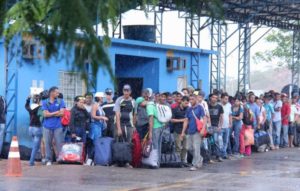Venezuela crisis worsens
 The exodus of migrants from Venezuela is building toward a humanitarian crisis on a par with the movement of people across the Mediterranean, according to the United Nations migration agency, the International Organisation for Migration (IOM).
The exodus of migrants from Venezuela is building toward a humanitarian crisis on a par with the movement of people across the Mediterranean, according to the United Nations migration agency, the International Organisation for Migration (IOM).
Growing numbers of people are fleeing the economic disaster that has seen people scrounging for food and other necessities of daily life.
The movement of refugees has threatened to overwhelm neighbouring countries and officials from Colombia, Ecuador and Peru will meet in Bogota are in negotiations to seek a solution,
Brazil has sent troops to border crossings after rioters this month drove hundreds back over the border.
Peru has tightened entry rules for Venezuelans, requiring them to carry passports instead of just national ID cards.
The UN estimates 2.3 million Venezuelans have fled since 2015 with Columbia expecting two million more to follow by 2020.
That would mean 4.3 million people – 14 per cent of Venezuela’s population – had left.
Last week, the IOM warned the mass migration is nearing a “crisis moment” comparable to events involving refugees in the Mediterranean.
Many of those now heading into neighbouring countries such as Brazil and Colombia are so impoverished they travel by foot.
Describing those events as early warning signs, a spokesman for the International Organization for Migration, Joel Millman, said funding and means of managing the outflow was needed.
“This is building to a crisis moment that we’ve seen in other parts of the world, particularly in the Mediterranean,” he said.
On Thursday, the IOM and UN refugee agency UNHCR called on Latin American countries to ease entry for Venezuelans, more than 1.6 million of whom have left since 2015.
Peru’s top immigration official, Eduardo Sevilla, said Peru will exempt some Venezuelans from the passport requirement, including parents with children seeking to join the rest of their family, pregnant women and the gravely ill.
But Sevilla said authorities would also be vigilant of attempts to evade the new rule by claiming refugee status.
The UNHCR has said neighbouring governments had made “commendable” efforts even though some reception capacities and services were overwhelmed.
But a statement said “some disturbing images” had emerged from the region in the past week that risked stigmatising Venezuelans who had fled and complicating efforts to integrate them.
Venezuela moved to shore up its crumbling economy recently, devaluing its currency and preparing to raise the minimum wage by more than 3,000 per cent in what the country’s president, Nicolas Maduro, declared a visionary bid to tame rampant hyperinflation.
Effectively, Maduro cut five zeros from prices and pegged the country’s currency to an obscure state-backed cryptocurrency.
Critics have slammed the plan as inadequate in the face of inflation that topped 82,000 per cent in July and is expected to reach a million per cent this year.
Laurie Nowell
AMES Australia Senior Journalist












